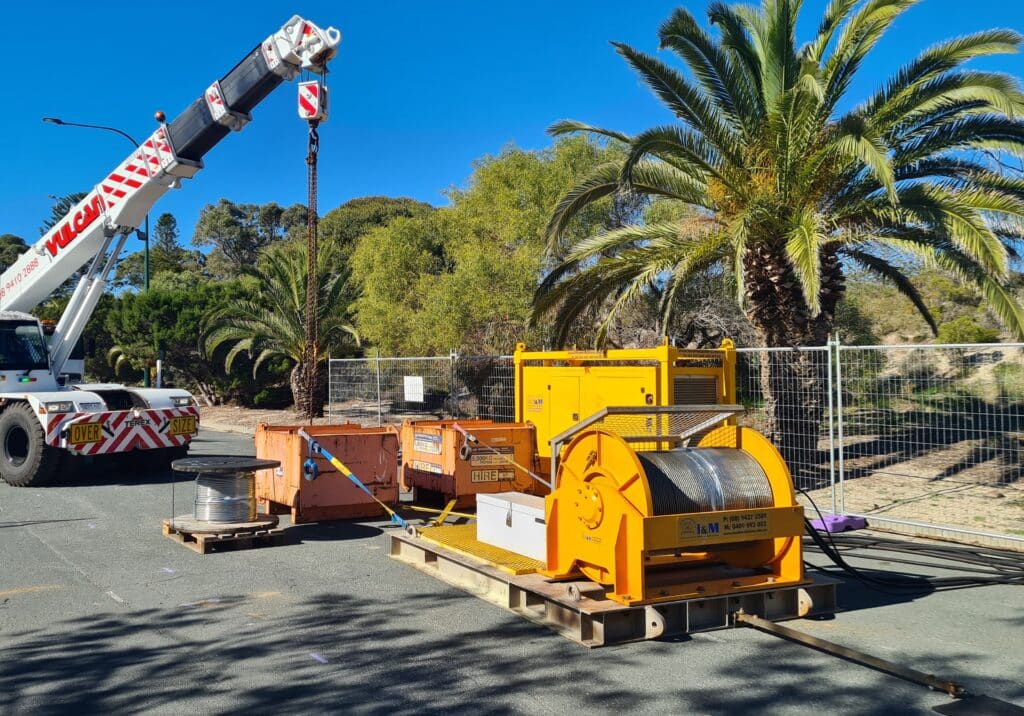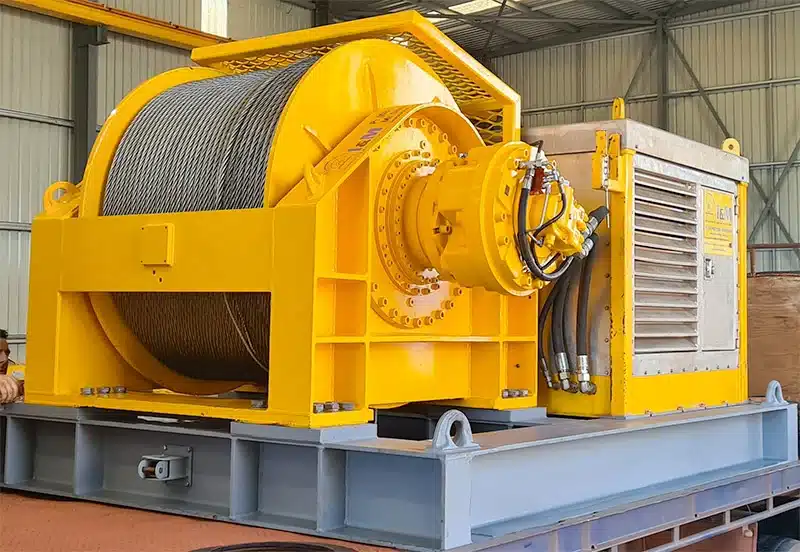Hydraulic power packs are the driving force behind many of our leading industries, from construction and mining to oil and gas and manufacturing. They operate heavy machinery, power lifting systems, control hydraulic tools, and so much more.
But how do you decide between diesel and electric power pack options? The right choice can boost your efficiency, cut costs and reduce maintenance headaches, so you want to get it right.
I&M Solutions is here to help. Ready to find the perfect fit for your needs? Let’s break down everything you need to know.
What is a diesel hydraulic power pack?

A diesel hydraulic power pack is a compact, self-contained system that uses a diesel engine to drive a hydraulic pump. This pump generates the necessary hydraulic pressure to operate various types of machinery, such as winches, cranes, hydraulic drills and lifts.
The unit typically includes a fuel tank, pump, motor, reservoir, and control system, all working together to provide reliable, mobile hydraulic power.
What is an electric hydraulic power pack?

An electric power pack is a hydraulic system that uses an electric motor to operate a hydraulic pump. The motor converts electrical energy into mechanical energy, which powers the pump.
As the pump operates, it generates hydraulic pressure by circulating hydraulic fluid from the reservoir through the system. This pressure is then used to operate a wide range of hydraulic machinery, such as lifts, presses, and small cranes.
What’s the difference between diesel vs electric hydraulic power packs?
Diesel and electric hydraulic power packs differ primarily in their power source and application suitability. Diesel power packs are highly portable, robust, and ideal for remote or off-grid locations.
For example, off-shore oil rigs often use diesel hydraulic power packs to power winches and other machinery. A key reason for this is that they provide reliable, high power in remote locations where electrical power is unavailable.
Electric power packs, on the other hand, are quieter, more efficient and produce fewer emissions. This makes them suitable for controlled environments like indoor construction projects, as they provide quiet operations and reduce noise pollution.
Diesel vs electric hydraulic power packs across industries
Different industries have unique needs when it comes to power solutions. The choice between diesel and electric hydraulic power packs is often influenced by environmental conditions, operational requirements, and specific tasks. To help you choose the right pack for your specific requirements, let’s explore how these power packs are utilised in different sectors:
Marine and Offshore
Marine and offshore operations rely on diesel hydraulic power packs because they provide high-power output for tasks like winching and lifting. Their portability and reliable performance also make them ideal for remote locations without a power grid.
In contrast, electric hydraulic power packs excel in controlled settings like shipyards, where their energy efficiency, quieter performance, and lower emissions are better suited for close-quarter operations.
Mining

In remote mining locations, diesel hydraulic power packs are commonly used to power heavy machinery like drills and winches due to their independence from the power grid. Diesel units are also excellent in mining because they offer mobility and reliability in rugged terrains.
However, in underground mining where air quality is crucial, electric power packs are increasingly favoured. This is because their clean and quiet operation reduces the risk of harmful emissions in confined spaces.
Construction

The construction industry uses both diesel and electric power packs. The choice between the two often depends on the project’s scale and location. For example, Diesel units are well-suited for large-scale outdoor projects. They offer high power output and mobility, perfect for handling demanding tasks like lifting and moving heavy materials.
Electric power packs, however, are more commonly used in urban areas or indoor projects, where regulations on noise and emissions are stricter. They’re also more ideal in these types of projects because they offer quieter, cleaner solutions for tasks like powering small machinery or performing maintenance.
Defence
In military operations, diesel power packs are usually preferred for fieldwork, providing portable and reliable hydraulic power in rugged, off-grid conditions. The defence sector uses these units in a range of applications, including operating cranes for heavy lifting and winches for efficient equipment handling.
Electric hydraulic power packs also play a critical role in the defence industry, particularly in maintenance depots and controlled environments. Their precision and quiet operation make them excellent for tasks like testing hydraulic systems in military vehicles or operating lifts and presses during equipment repairs.
What to consider when choosing between diesel vs electric hydraulic power packs
When choosing between diesel and electric hydraulic power packs, several factors should be taken into account:
- Power output requirements
What level of pressure and flow does your application demand? Diesel packs are ideal for heavy-duty tasks like lifting or drilling, while electric options are perfect for precision-focused, lower-power operations.
- Consider environmental impact
Will your work take place in noise-sensitive or regulated areas? As mentioned above, electric packs are quieter and emission-free, making them environmentally friendly. If you need a hydraulic pack for an open or less regulated environment, a diesel pack may be your better choice.
- Think about the location
Are you working remotely or off-grid? If so, Diesel packs don’t need external power, offering you a reliable power source. Whereas electric power packs are more appropriate for fixed locations with a reliable power supply, such as maintenance depots or urban project sites.
- Factor in maintenance
Do you want a low-maintenance option? Diesel units need more upkeep due to their rugged use. Electric units, with fewer moving components, are typically more straightforward to maintain, giving you a cost-effective option for long-term operation in controlled environments.
- Budget and long-term costs
Think about both your initial and operational costs. What’s your budget for now and the future? Diesel packs have lower upfront costs but higher operational expenses, while electric packs cost more initially but save on energy and maintenance over time.
Find the perfect solution for your project
Whether you’re working in remote mining locations, offshore environments, or controlled indoor spaces, selecting the right hydraulic power pack is essential for efficiency and performance.
At I&M Solutions, we offer a wide range of diesel and electric power packs for hire, designed to meet the demands of industries like marine, mining, and construction. With high-performance units and flexible rental terms, we ensure you have the right power pack for your unique operational needs.
Our expert team is ready to guide you to the best solution for your project. Contact us today to learn more or request a quote.



